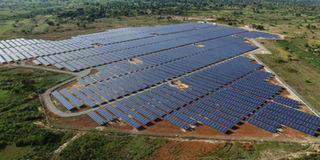Tororo’s 14 Gigawatt solar plant to boost trade

An aerial view of the Tororo solar power plant. COURTESY PHOTO
Tororo- The installation of the Shs7.4 billion solar plant in Tororo District is set to improve access to power and also boost trade in eastern region, leaders have said.
The solar plant has more than 32,240 photo voltaic panels and sits on a 14-hectare piece of land in Asinget Village, eight miles off Tororo-Jinja highway. It will generate about 14 Gigawatt hours (GWh) of clean energy per year. GWh is a unit of energy representing one billion watt hours and is equivalent to one million kilowatt hours. Gigawatt hours are often used as a measure of the output of large electricity power stations.
The project, which is developed under the Global Energy Transfer Feed in Tariff support scheme for renewable energy projects managed by Germany’s KfW Development Bank in partnership with Uganda’s Electricity Regulatory Agency (ERA), is funded by the governments of Norway, Germany, and the United Kingdom.
During the commissioning of the solar plant last year, State minister for Mineral Development Peter Lokeris said it will produce enough power to supply more than 170,593 homes for both domestic and commercial use.
He added that the government is focusing on the clean renewable energy sector, which produces electricity from wind, solar, hydro and biomass in order to reduce on carbon emissions.
“This is one of the interventions geared at ensuring consistent power supply, most especially to serve emerging heavy duty cement factories and the rest of the districts in the eastern part of the country,” Mr Lokeris said.
The minister added that new factories, including the phosphate mining factory, will need reliable power to operate and that the solar plant will close the gap.
Ms Helen Emagalet, a trader in Asinget Trading Centre, says the establishment of the plant is an opportunity for small scale entrepreneurs to boost their businesses. “This is a good opportunity for us as business entrepreneurs in this rural area because we will be in position to operate our computers and refrigerators, which has not been possible due to lack of power,” she says.
Appeal over tariffs
Mr James Akabwait, another trader, requested government to ensure that power tariffs are affordable to the ordinary people.
Mr Julius Wandera, the ERA senior communications officer, said the tariff for power from the solar plant will be at 16.9 US cents per kilowatt hour (KWh) for a period of 20 years.
“The consumers will only pay 11 cents per KWh while the remaining 5.9 cents will be covered by the development partners,” he said.
Mr Wandera explained that during the seven months of the plant’s construction, more than 350 jobs were created and more youth will be employed when it finally gets connected to the grid.
“More youth will be employed to assist with the operation and maintenance of the facility,” he said, adding that jobs in solar heating and cooling, installation, sales, research and development will also be created.
Mr Fredrick Angura, the Tororo South County Member of Parliament, said the initiative will address the electricity needs of the communities and spur urbanisation.
“With electricity available, our people will be in position to engage in small income generating projects such as selling water,” he said.
Tororo was in 1960’s considered as the second largest industrialised district after Jinja. It formerly had such as Tororo Industrial Chemicals and fertilisers (TICAF), Uganda Jute and Hessian, Tororo Steel Works, Tororo Oil and Soap Works, Universal Abestos and South Bukedi Cooperative Union ginnery, which have since collapsed.
Mr Angura appealed to government to consider lighting the neighbouring communities as a token of appreciation to the residents for accepting to give out their land to build the plant.
“It will be unfair for the village Asinget to remain in darkness yet it hosts the biggest power station,” he said.
Cement companies Simba and Hima, which have set up new factories in the district, are all expected to benefit from the power. Mr Morgan Gagrani, the executive director Tororo Cement Industries Limited, says the plant will address power shortage and quality, which he says has been lacking and affecting their production.
“We have been facing power shortages, which affects our operations but we are now excited,” he said.




